Classmate/Friend: Victor J. West

Woodward (third from the right) sitting on a fence with friends in Peoria, IL.
We can't exactly identify the others in the picture
but believe that the young man with the broom is Joseph Cowell
(fourth from the left). The year this picture was taken is unknown.
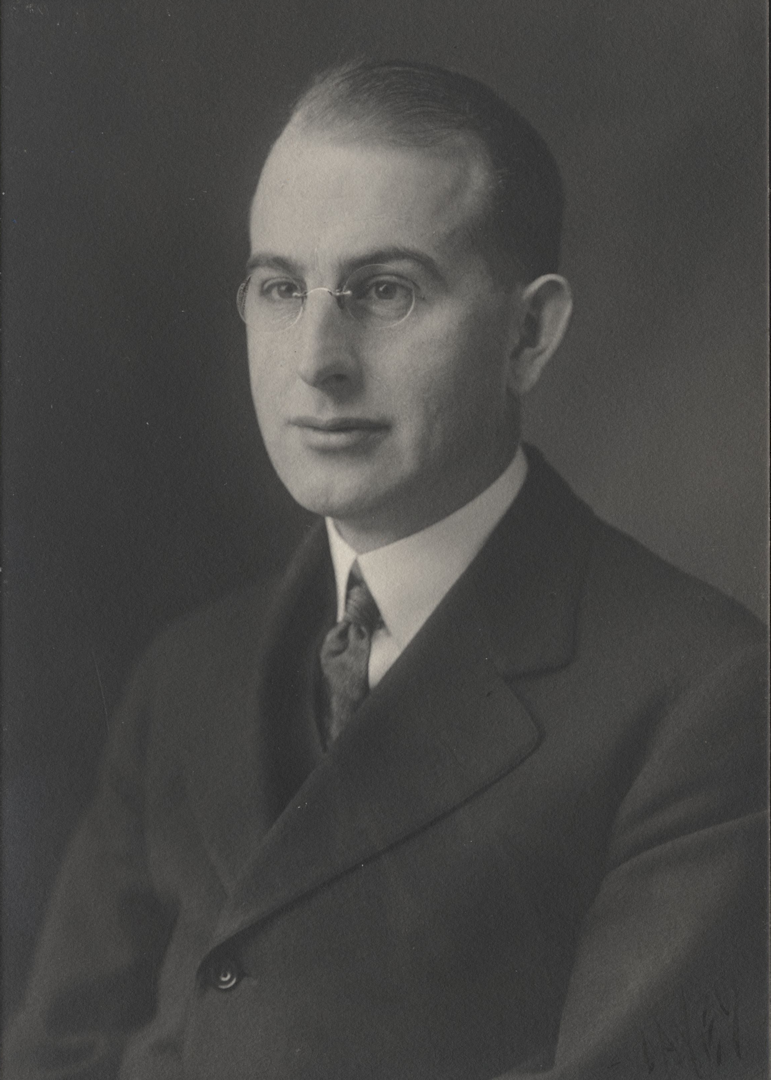
 A portriat of Victor J. West from
A portriat of Victor J. West from
Stanford University's Cecil Green
Library website archive
Victor J. West (1880 - 1927) met Woodward at the Bradley Institute of Technology in Peoria, IL, in 1902. It was RSW's first year in Peoria after spending much of his previous years bouncing about Ohio with brief stops in Knoxville, TN and St. Louis, MS. Woodward's father Orion Leroy (O.L.) was a real estate developer during the booming growth of the country's urban landscape. His job would require moving his family often. By RSW's own account, he attended as many as 18 different schools in an 11-year period of time. The Woodwards arrived in Peoria for O.L. to oversee the development of the historic "Uplands" neighborhood adjacent to the Bradley Campus. It would be the longest period of stability in RSW's young life to date. He would spend four years in Peoria earning his high school diploma and staying on, under scholarship, for two more years, taking college-prep courses and acting as a teaching assistant in Literature. His last two years in Peoria would be spent without his parents who moved on to Los Angeles where O.L. would remain during the rest of his career.
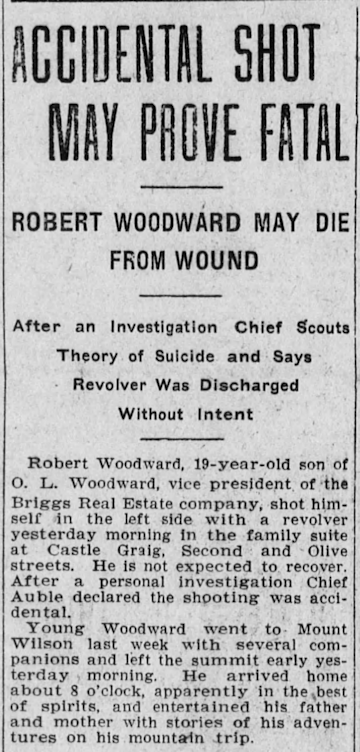
 The September 7, 1906 Los Angeles Herald
The September 7, 1906 Los Angeles Herald
article regading RSW's accident
RSW, along with Victor and another friend, Fred Bourland (the son to the family by whom RSW stayed with in Peoria while his parents were in LA), in May of 1906, all headed to LA in May of 1906 to join RSW's parents and come to work for O.L. at his place of work, the Briggs Real Estate Company. Victor, who graduated from the University of Chicago in 1905, worked as the company's secretary. RSW never mentions what his or Fred's duties at the company were but we do know that Woodward chose to take a gap year to earn money for school. We believe, here at the website, that RSW was delaying going to school because his father wanted him to follow in his footsteps studying engineering and go to Stanford University (then, Leland Stanford Jr. University). However, RSW was unwavering in his desire to study art at the Boston Museum of Fine Arts School in Boston, MA. In fact; this would be the third-year RSW would put off going to college and even after his accident. RSW's father's desire remained steadfast that he goes to Stanford.
1906 would also be his last chance to go to school able-bodied before his accident, which would occur Labor Day of the coming September (3rd). We believe that Victor and Fred were the friends RSW went camping with the weekend before that fateful Monday morning. So Victor was there when it happened, not necessarily in the room but certainly at the same hotel. In a letter [1907] to another childhood friend Helen Ives Schermerhorn, RSW tells Helen that Victor was the one who wrote his letters those first couple of months following his accident. He also explains to her the origins of his friendship with Victor, "...Vic is considerably older than I, twenty eight, but was at Bradley during my first year. He's one of the fraternity and a very wonderful good boy indeed. I've always been very close with him..."
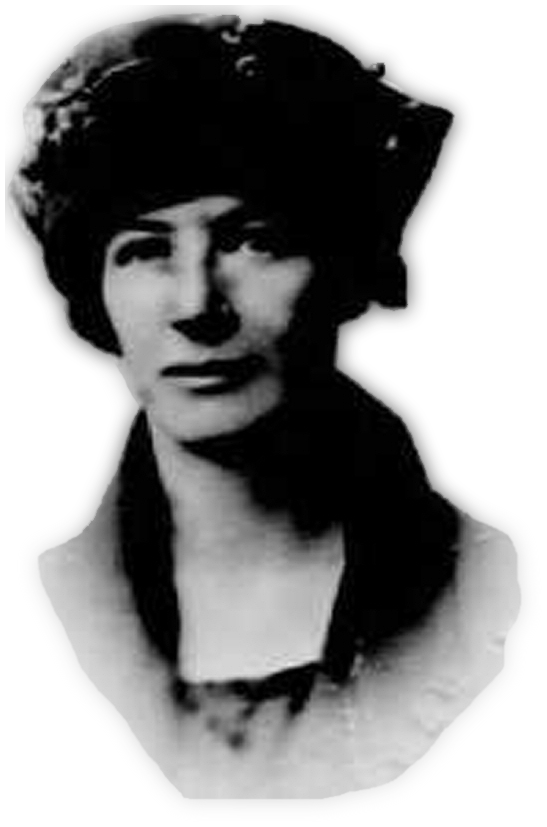
 From Helen Ives passport
From Helen Ives passport
photo, 1920
Despite the age difference and Victor's more advanced education, the two friends shared a common interest in philosophy, "Last summer [1906], as Vic and I read thru various books of philosophy, I fixed up quite definitely to myself my conceptions and intuitions of the Universe. It worked out into a sort of geometrical figure..." It may surprise some to learn this but RSW loved the written word and ideas nearly as much as he did nature. He once remarked in a 1907 letter to Helen that, "I usually wish I too might be a 'becoming writer of note' in all earnest. It would be so delightful to have something to say to the world, something of vital life interest, and to be able to say it as one should -- to be a Carlyle, Macaulay, a Voltaire, or Ibsen, and -- by all means a Browning. But during such wishes I catch myself and say, knowing within me the while, that it's to be quite as beautiful to be an artist , to tell men of godly beauty thru color and form, my religion, especially the former." What is of note here is that both friends, Victor and Helen, went on to scholarly notoriety. Helen wrote a book funded by the Department of Naturalization titled, "Citizen instruction: The Problem confronting the classes in Hackensack," and we found two references to her book being one of the "most widely held works about the United States."
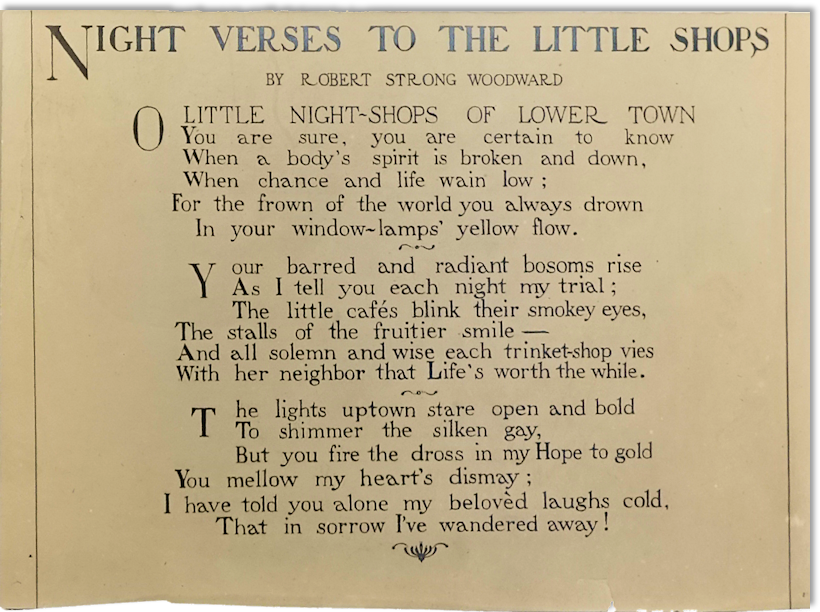
 From an illumination, Night Verses To The Little Shops,
From an illumination, Night Verses To The Little Shops,
made to be published in an unnamed magazine.
The written word was another shared interest between RSW and Victor. In praising Helen for some limericks she sent him [we only have one side of the conversation because RSW did not keep her letters] he tells her, "Do you know Vic does the same thing - he hardly ever comes up here without some bit about 'the crocodile lacrimose, with the tears running down his nose' - or 'three little teeth that thqueeked, and thqueeked and thqueeked', or the 'grass hoppers on a wintry day...'" We do not know how long Victor stayed working for the Briggs Company. Woodward's letters to Helen waned during the years of 1908 thru 1910. This could have simply coincided with her graduation from Vassar that year were she then went on to a career in teaching, starting with The Brown School in Schenectady, NY. It is very likely he left LA to continue his education but where we could not tell you because it is not cited in anything we have found. What we do know is that Victor was teaching at Northwestern University in 1913 when Stanford recruited him to come to Palo Alto. Upon reflection, we are realizing that Victor's time with the Briggs Company was more than merely a stop-gap, earning money with friends affair. Real estate development, particularly in urban setting, was of great interest to him. He would go on to a career spent as an advocate of responsible development. A quote from the initial Stanford Daily article announcing his death [Feb. 28, 1927], stated, "Public sentiment meant nothing to him. He was fearless in his denunciation of any political policy which he truly considered to be detrimental to the best interest of the whole."
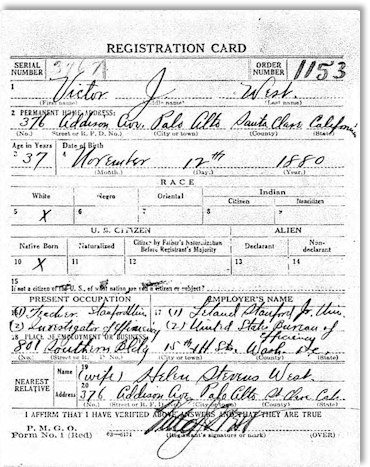
 West's 1918 Draft Registration
West's 1918 Draft Registration
Victor began his career at Stanford as an associate professor of Political Science in 1913 when Stanford would recruit him away from teaching a Northwestern University in Chicago. In 1917, he would co-author a book, Foreign Policy of Woodrow Wilson, 1913 - 1917, (Google Books Link) with fellow Stanford professor Edgar E. Robinson. To our delight, we managed to find an advertisement for the book in the 1917 July - Dec. issue of Atlantic Monthly, as well as, a review from the Christian Advocate! (see below). He would then be promoted to Full Professor sometime in 1918 and shortly thereafter be appointed "executive head" of the newly formed and independent Political Science Department. He would be the department's first but there is no mention of an official title, like "Dean" or "Director," so we do not know exactly what to call him. In our extensive search of the Stanford Daily Archives he was consistantly referred to as "political science department head..." so we will stick with that. In his time as Head of the Political Science Department, he travelled and lectured quite often. He would act as moderator for round table discussions and lead numerous conferences throughout the country.
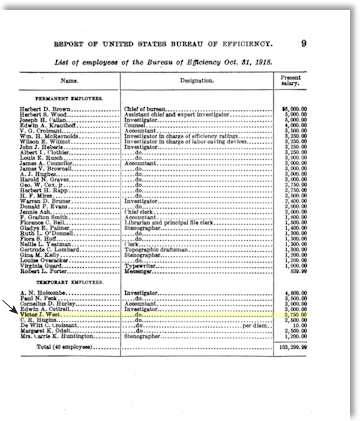
 From a Bureau of Efficiency 1916 -1917 Report
From a Bureau of Efficiency 1916 -1917 Report
is a list of Bureau employees and their salaries
Victor is under temporary employee earning $2,750
What did come as a surprise to us in our research was that Victor had a second job as seen and listed in his dated, Sept. 5, 1918,
draft registration. He also worked for the U.S. Bureau of Efficiency. The U.S. Bureau of Efficiency (1916 -1933) was born out of a movement to reform government processes and standards. This movement
began in 1871 when President Ulysses S. Grant and Congress passed Civil Service reform law that created the first United States Civil Service Commission. The Commission was an agency and was created
to standardize the selection of federal government employees based on merit rather than relationships. It is considered part of an overall "progressive" movement prompted by the rapid change and
expansion of the period. The U.S. Bureau of Efficiency originated as part of the Civil Service Commission in 1913 and became an independent agency in 1916. The Bureau sought to bring the principles of
"scientific management" to the federal government. "Charged with conducting management and policy analyses at the direction of the president, this bureau presaged the emergence of the activist and
modern executive branch." Ironically enough, the Bureau of Efficiency would face considerable push back beginning as early as 1923 for its own waste and inefficiency. One possible indicator of such excess
could be found in the bureau's employees. West, listed as a "temporary" employee in the Bureau's Oct. 1918 published report, was earning an astounding $2,750/yr, the equivalent to $65,000 in today's
dollars. We do not know what his salary at Stanford was... Victor was also an active member of the National Municiple League, inspired by Theodore Roosevelt, as a leading force in the new Progressive
Movement... America's new urban professional working class, who sought to replace corrupt, graft-ridden city governments with honest and "scientific" administrations." He served by appointment to
numerous Government Commissions particularly those relating to urban planning and city development and was a member of the National Political Science Association.
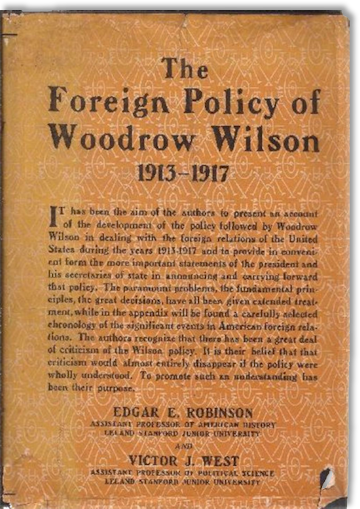
 An image of the Robinson / West book
An image of the Robinson / West book
Foreign Policy of Woodrow Wilson
1913 - 1917
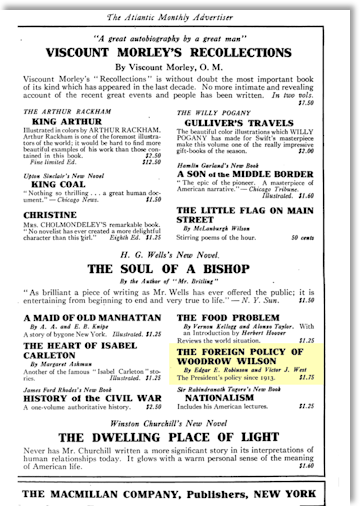
 Atlantic Monthly (Jul. - Dec. 1917)
Atlantic Monthly (Jul. - Dec. 1917)
advertisement page for
MacMillan Company, Publishing
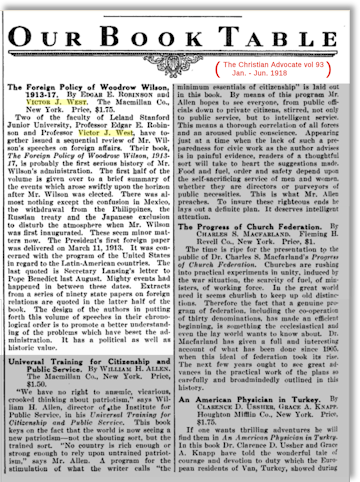
 A book review published in
A book review published in
The Christian Advocate, vol 93
(Jan. - Jul. 1918)
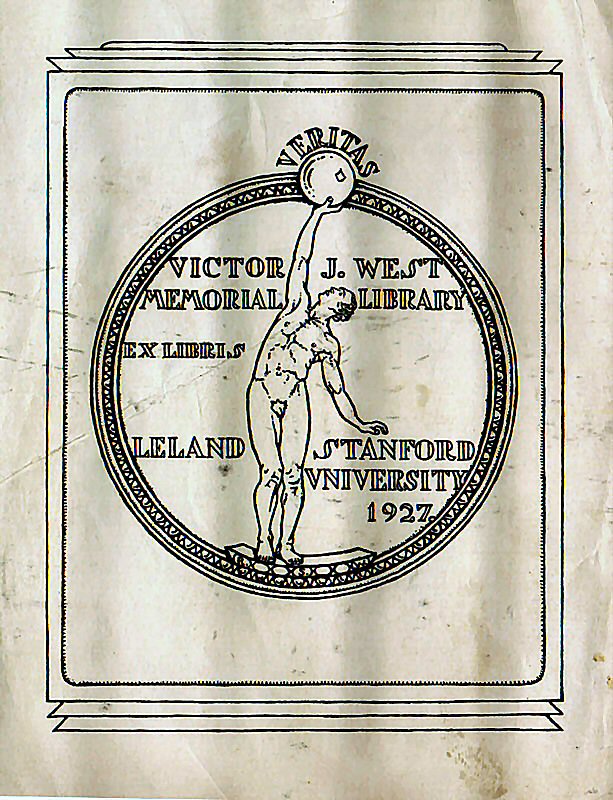
 A bookplate by RSW for the
A bookplate by RSW for the
Victor J. West Memorial Library
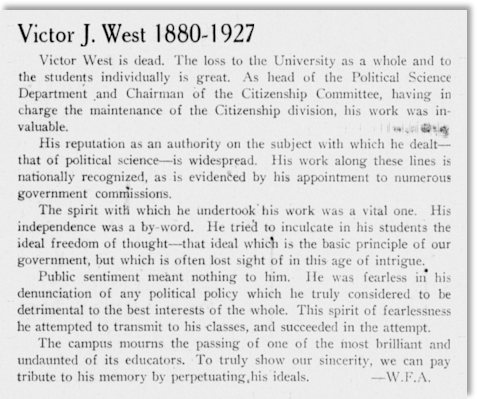
 The February 27, 1927 Stanford Daily
The February 27, 1927 Stanford Daily
announcement of Victor's passing
As fortune would have it, in 1927, Victor experience an unexpected
and brief illness. He would die on Feb. 26, within a week of getting sick. No details are given as to the nature of the illness. We do know the illness originated as a blood infection and brought on "double
pnemonia" which was given as the official cause of death. He was 47 years old and left behind his wife Helen, 38, two daughters Marjorie, 2, and newly born Mary. We do not know how it came to be, but
RSW well into his oil painting career made a bookplate in memorandum for his dear friend. We imagine, given the content of the bookplate, it was to be placed inside his collection of books and documents
donated to the Stanford Library. We do not know who made the request, however, it was in all likelihood Victor's wife Helen. According to one obituary, Victor was a year away from publishing a new book.
We could not find anything relating to what happen to the book or his materials related to it.
Victor's wife Helen, active in the Stanford community often organizing faculty events, remained so
after Victor's passing. We located several annoucements, listing her as the organizer, well into the mid-1930s. Victor's legacy at Stanford is unclear. In 1930, the political science fraternity, Pi Sigma Alpha,
gave a gift of $50 to the Political Science Department to be spent supplying books to the West library and pledged to do so annually. However, the Cecil Green library does not list any collection under West's
name and the only item in their archives is his portrait. CLICK ON the PDF icon below to read Victor's obituary and memorial...

